The golden retriever is a large sporting dog of Scottish origin. Golden retrievers are also commonly referred to as yellow retrievers and flat-coated retrievers.
Golden retrievers are devoted, playful, and loyal dogs that are even-tempered and highly affectionate. These dogs grow between 21.5–24 inches tall, and weigh between 55–75 pounds, depending on their age and gender. They live between 10–12 years and are easy to train from a young age.
Golden retrievers are gentle with others, which makes them suitable for households with children of all ages and other pets. This breed is not suitable as a guard dog because these dogs are friendly even to strangers. They are moderate to heavy shedders and need regular grooming.
Golden retrievers typically cost between $200–$3000.
TABLE OF CONTENTS
Golden Retriever Characteristics & Overview

From Adobe Stock
| Common names: | Golden retriever, yellow retriever, flat-coated retriever |
| Origin: | Scotland, Great Britain |
| Breed group: | Sporting dog |
| Size: | Large |
| Height: | 21.5–24 inches |
| Weight: | 55–75 pounds |
| Colors: | Golden, dark golden, light golden |
| Coat: | Double coat, medium length hair |
| Life expectancy: | 10–12 years |
| Temperament: | Trustworthy, friendly, obedient, eager to please |
| Shedding: | Moderate to heavy seasonal shedders |
| Barking tendency: | Minimal, only to alert owners |
| Cost: | $200–$3,000 |
Origin & Purpose
Golden retrievers were bred in Scotland in the 1800s by Lord Tweedmouth to assist hunters in collecting waterfowls, and to be even-tempered in the home. They were bred from various other breeds including setters, retrievers, spaniels, bloodhounds, and the now-extinct tweed water spaniels.
Hunters preferred to use golden retrievers because this breed has a gentle bite that didn’t injure the waterfowls, resulting in the bird being delivered to the hunters in one piece. Today, golden retrievers are often seen as therapy dogs because of their intelligent nature, making them a suitable option for those in need of a service dog.
The Kennel Club in England officially named the dog “retriever – yellow or golden” as a breed in 1911, and later in 1920, the name of the breed was changed to “golden retriever.”
Lifespan
Golden retrievers generally live between 10–12 years if they are well looked after, with a healthy diet, plenty of exercise, and if they don’t have any major health issues.
They are generally healthy dogs that live full lives. However, they are prone to several common health issues that can reduce their lifespan.
Golden Retriever Appearance
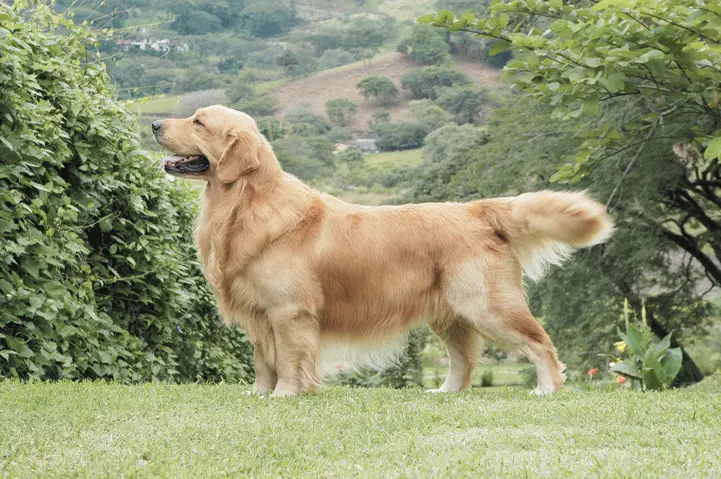
From Adobe Stock
Golden retrievers have a golden coat that ranges from light cream to dark golden, with fairly long fur. The physique of a golden retriever is large, ranging from lean and sporty to broad and dense.
These dogs have a happy face, and a tail that is often referred to as having a “merry action,” pronounced by the dog’s smooth, powerful gait.
Height and Weight
Golden retrievers are considered large dogs, with a height at the withers of up to 24 inches, and a weight of up to 75 pounds. Male golden retrievers measure between 23–24 inches high and weigh between 65–75 pounds, while females measure between 21.5–22.5 inches high and weigh between 55–65 pounds.
Golden retrievers reach their full height when they are about one year of age, and reach their mature weight at two years old.
Colors
Golden retrievers are typically golden, dark golden, or light golden. The officially recognized colors of the breed are varying shades of golden. Although some breeders sell rare white golden retrievers, this color is not recognized as a color for the breed by the American Kennel Club (AKC).
Coat
Golden retrievers have a thick double coat with medium-length hair that varies between straight and wavy. Their coat is made up of a dense water-repellent outer coat and a thick undercoat. Their fur feathers heavily on this breed’s chest, tail, underside, and rear thighs.
Golden retrievers are seasonal shedders, shedding moderately in summer and winter and heavily in spring and autumn. The high shedding level means they need regular brushing and grooming.
Personality and Temperament
According to the AKC, golden retrievers are trustworthy, reliable, loving, and friendly, and tend to get along with other dogs without being timid or aggressive. Golden retrievers are eager to please and are outgoing family dogs that also enjoy working hard when trained to do so. This is a good breed for families with children and other pets.
Golden retrievers are mouthy dogs, and will chew and bite anything they find, unless this behavior is trained out of them. Give your dog plenty of toys and balls to chew on and play with.
Barking
Golden retrievers are quiet dogs and don’t bark often. They may bark to alert owners to strangers, however, they don’t have guard dog instincts. This breed may bark when left alone for long periods, but this behavior can be trained out of them from young.
Golden Retriever Care
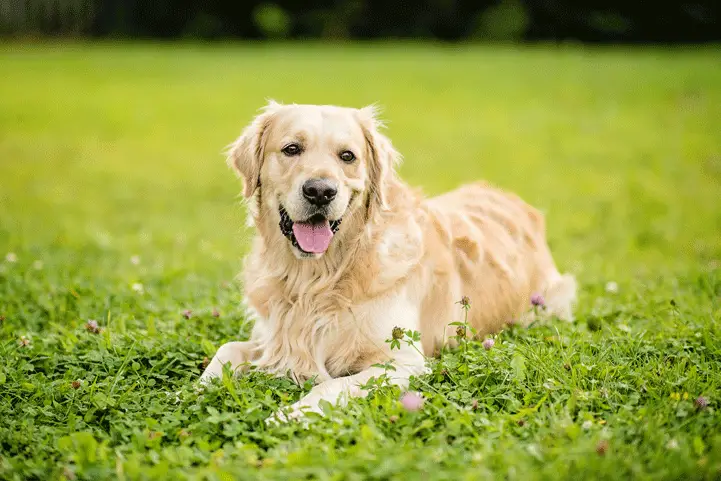
From Adobe Stock
Due to their long, golden coats, golden retrievers need regular grooming and bathing. During grooming sessions, you should keep an eye out for infections, rashes, and sores.
Golden retrievers are active dogs that need daily exercise and two meals of high-quality dog food each day.
Food Needs
Golden retrievers need two healthy meals per day, a total of 2 to 3 cups of high-quality dog food. The amount you feed your individual dog will depend on its size, age, and activity level.
Golden retriever puppies between four to seven months old grow quickly, and should be fed a low-calorie and high-quality diet to ensure proper bone growth.
Grooming Needs
Golden retrievers are moderate to heavy shedders that should be groomed daily to prevent their feathered fur from tangling. Keep a daily brushing routine, and during the grooming sessions, check your dog’s ears for signs of infection.
Bathe these dogs at least once a month or when they have soiled their coats. Golden retrievers are active and often get dirty playing in dirt.
Trim your dog’s nails once a month or as soon as they are noticeably long. Be careful to not cut the nails too short, or you will hurt the dog. Take your dog to a grooming professional if you are unsure.
Brush your golden retriever’s teeth two or three times a week. Make grooming a positive experience for your dog from young by using treats so that handling it is easier when it grows older.
Exercise Needs
As a sporting breed, golden retrievers need plenty of exercise every day to stay happy and healthy. Due to their sociable nature, golden retrievers enjoy accompanying people on hikes, runs, and water activities such as swimming in lakes or pools.
Vigorous exercise for 20–30 minutes each day in the form of a play session or a game of fetch is recommended for this breed.
If you live in a small apartment, make sure your golden retriever receives enough exercise to prevent undesirable behavior.
Mental Needs
As a highly intelligent breed, golden retrievers need a high level of mental stimulation. Stimulate your dog by hiding treats in toys, playing fetch, or teaching them new tricks. A good game of hide-and-seek or tug-of-war will also stimulate your golden retriever.
Common Health Concerns
Golden retrievers are generally healthy dogs, although they are more prone than some other breeds to some diseases, such as cancer. The two most common cancers found in this breed are:
- Hemangiosarcoma: A form of cancer that affects the lining of the spleen and blood vessels, and usually occurs in middle-aged and older dogs. Common symptoms of hemangiosarcoma include rapid weight loss, lameness, dementia, seizures, rapid heartbeat, and a noticeable abdominal mass.Treatment includes blood transfusions, chemotherapy, and surgery if possible, but the outcome is usually a few extra months to live.
- Osteosarcoma: A type of malignant bone cancer that commonly affects large breed dogs. The symptoms of osteosarcoma include decreased appetite, a noticeable mass, dehydration, pain when walking or limping, and an elevated heart rate.The outcome for this cancer is usually not good, but possible treatment includes chemotherapy, surgery, and palliative care.
Other health issues that may affect golden retrievers include:
- Allergies: Golden retrievers are susceptible to allergic reactions from various substances including pollen and dog food. A vet can recommend possible medications for allergies.
- Elbow dysplasia: A heritable condition that is often seen in large dogs. Elbow dysplasia is caused by the varying growth rates of the bones in a dog’s elbow. Surgery or medication may be necessary as treatment solutions.
- Gastric dilatation-volvulus: Also known as bloat, this life-threatening condition is common in large dogs with deep chests. This condition can be caused by large meals, rapid eating and drinking, or exercising too soon after meals.Immediate vet assistance is recommended if you notice your golden retriever retching, drooling excessively, lethargic, restless, or weak with a rapid heart rate.
Training

From Adobe Stock
Golden retrievers are intelligent and eager to please, which makes them highly trainable dogs. Early socialization is important to get your dog accustomed to other people and dogs, especially when it is between seven weeks and four months old.
Group training classes help your golden retriever to socialize while undergoing obedience training. Use positive reinforcement methods to train your dog, while keeping the training sessions fun. Training should be consistent and age-appropriate for the best results.
Train your golden retriever every day, starting when it is eight weeks old. Keep sessions shorter for younger dogs, as puppies have shorter attention spans than adult dogs.
Golden Retriever Price
Golden retrievers are expensive, and buying from a shelter costs a lot less than purchasing from accredited breeders.
How Much Is a Golden Retriever?
A golden retriever typically costs $200 to $3,000. Buying a golden retriever from a reputable breeder costs between $1000–$3,000, while adopting from a shelter costs between $200–$500.
An adult golden retriever from a shelter can cost as low as $50–300. Trained service dogs cost up to $25,000 because of the training requirements.
How Much Does it Cost to Own a Golden Retriever?
In the first year of owning a golden retriever, it will cost you between $2,000–$3,000 including initial vet costs, basic puppy supplies, training costs, grooming items, toys, and puppy food.
When your puppy has matured after the first year, you can expect to pay roughly $2,000 each year for dog food, vet bills, grooming supplies, and other expenses.
Is a Golden Retriever Right for You?
Golden retrievers are popular family dogs that offer loyalty, love, and affection to all the members of your family, including other pets. Their intelligence and playful nature will keep you entertained and active.
This breed might not suit certain lifestyles due to their tendency to shed, and their large size.
Who Should Get a Golden Retriever?
Golden retrievers are well-suited for families who are often at home and available to give their dog attention. Families with young children get along well with this breed because of the dogs’ gentle and caring nature.
With early socialization, golden retrievers get along with other pets including dogs, cats, rabbits, and birds.
A golden retriever is social and needs to be treated as part of the family. This breed should sleep inside rather than outside, and should be played with often. Golden retrievers enjoy a large fenced-in yard, although they are satisfied in an apartment if they receive daily exercise in a park or by going for walks.
Who Should NOT Get a Golden Retriever?
Golden retrievers aren’t suitable for families and owners who are away from home a lot and don’t have time to give their attention to their dog. Owners who prefer dogs with minimal shedding shouldn’t consider this breed as a pet because of their constant shedding and grooming needs.
Non-active families shouldn’t consider golden retrievers because this dog needs regular exercise and prefers doing activities with their owners rather than being let out to play by itself.










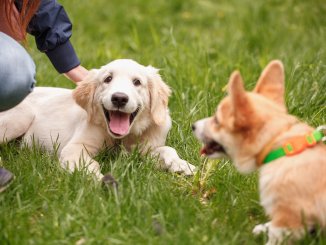
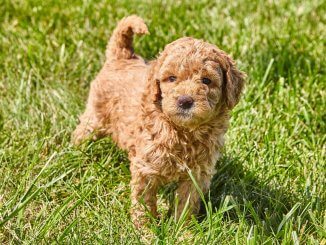

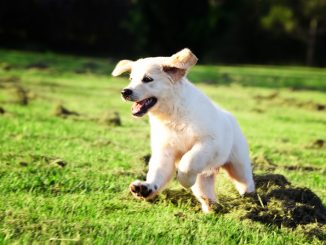

Be the first to comment